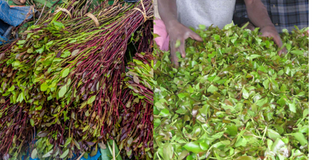Why Miraa is losing its market to Muguka

A photo of Miraa (left) and Muguka (right).
What you need to know:
- Currently, exporters have to pay a compulsory ‘commission’ of USD6.3 per kilo of Miraa which is equivalent to Sh82, 000 per bag before the cargo leaves for Somalia.”
- “When you include charges such as cess, transport, taxes and cargo handling, the costs add up to USD27 (Sh3,550) per kilo of Miraa."
Miraa farmers and traders in Meru are now calling on the government to fast-track the revitalisation of the crop as prices continue to plummet.
Over the last three months, miraa farm gate prices have nose-dived from Sh50,000 per 100kg bag to Sh15,000 – sparking an outcry from farmers.
Traders are now blaming the price decline on an invasion by a cartel that demands USD6.3 (Sh828) per kilo and the shrinking local market due to competition from Muguka, a khat variety grown mostly in Embu.
The price drop was confirmed by Agriculture Cabinet Secretary Mithika Linturi, also a Miraa farmer, in a local TV interview on Sunday. He said a buyer offered Sh50,000 for Miraa, which he had previously sold at Sh380,000.
According to the Nyambene Miraa Trade Association (Nyamita), many khat chewers are opting for cheaper alternatives, leading to low demand amid a high supply.
Exporters are also said to have lowered farm gate prices to cover up for the hefty "cartel commission" demanded before a cargo plane takes off.

Residents of Thunu village, Igembe South sub-county in Meru county prepare khat for sale. Over the last three months, miraa farm gate prices have nose-dived from Sh50,000 per 100kg bag to Sh15,000 – sparking an outcry from farmers.
Consequently, since last week, hundreds of Miraa farmers and traders in Meru have been holding rallies to protest a sharp drop in farm gate prices for the once lucrative crop.
While farmers have blamed the poor prices on cartel behaviour in the miraa trade, Nyamita chairman Kimathi Munjuri says traders need to reorganise the local market as the government fixes the export destinations.
“After the Covid-19 pandemic, Somalia, which is our main export market, imposed a quota system which limits our supply to about 20 tonnes in a day. This leaves us with a lot of miraa without a market,” Mr Munjuri explains.
He also cites the failure of Miraa stakeholders to come to terms with changing customer needs and dynamics, hence the massive market loss to Muguka.
Mr Munjuri says while Muguka is delivered in various markets early in the morning, Miraa hits the market in the evening, giving the former a competitive edge.
“Over the years, we have lost about 70 per cent of our market to Muguka.
Previously, we used to deliver 10 tonnes to Eastleigh per day but this has reduced to one tonne. In Mombasa, the supply has also declined from 10 tonnes to one tonne while in Garissa, we supply about 500 kilos down from four tonnes we used to supply,” he says.
The Nyamita spokesman added that many exporters were abandoning the business due to the high trade cost.
He noted that a "cartel commission" introduced in 2022 continues to make Kenyan khat less competitive than the one from Ethiopia.
“Currently, exporters have to pay a compulsory ‘commission’ of USD6.3 per kilo which is equivalent to Sh82, 000 per bag before the cargo leaves for Somalia.”

A farmer working on his Muguka farm in Gatitika Vilage, Kirinyaga County on July 5, 2023.
“When you include charges such as cess, transport, taxes and cargo handling, the costs add up to USD27 (Sh3,550) per kilo. This is extremely expensive,” he says.
Hence, a kilo of Kenyan khat must retail for at least USD30 (Sh3,945) in Somalia if a trader is to make a profit.
This, he says, has pushed farm gate prices to the low as traders struggle to make returns on their investments.
Miraa farmers and traders are now calling on President William Ruto to deal with the cartel charging a compulsory commission at JKIA.
“Immediately the president’s election was confirmed by the Supreme Court, he came to Maua and vowed to deal with the cartel after taking the oath of office. Two years down the line, no action has been taken. The miraa trade is bleeding,” Mr Munjuri said.

Naftaly Kirimi (in red cap) a miraa (Khat) farmer inspects the plant in his one-acre farm along Nyahururu- Nyeri highway at Ngobit ward, Makutano area in Laikipia county.
He said the implementation of Miraa regulations and the opening of new export markets would salvage the crop.
[email protected]





